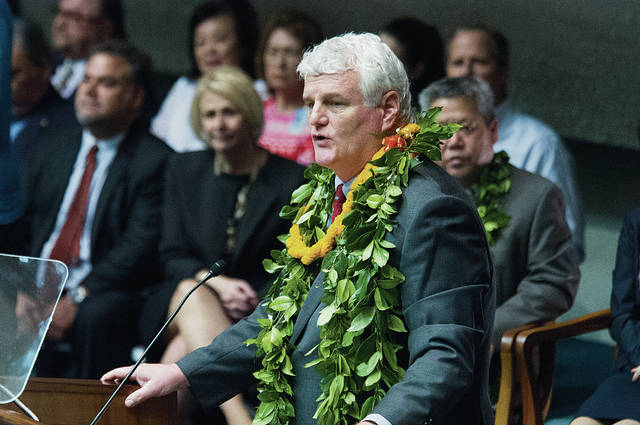Hawaii Supreme Court Chief Justice Mark Recktenwald is asking state lawmakers to fund four additional judges, including a new District Court judge on Oahu to help handle a surge in drunken driving cases over the past decade.
In his State of the Judiciary speech Thursday before a joint session of the state House and Senate, Recktenwald also urged lawmakers to fund a new Family Court judge on Oahu, an additional Family Court judge on Kauai and a District Court judge on Maui.
“While there is much work to do, we have a strong foundation to build on,” he told lawmakers. “With the support of
the Legislature and the
(Hawaii State) Bar, we
are exploring new ways
to use technology.”
He said those high-tech efforts range from using text messages to remind criminal defendants to appear for court to using artificial intelligence to make the civil litigation process more understandable for people who represent themselves in court.
But court officials also have told lawmakers during budget briefings this year that some judges are swamped with cases.
Courts officials said the sole Family Court judge on Kauai was responsible for more than 2,000 new Family Court filings last year, and the population of Maui has more than doubled since the last District Court judge was added there in 1982.
Courts officials say the average caseload for Family Court judges on Maui last year was 1,913 cases, while the caseload for Family Court judges on Hawaii
island averaged 3,065. The caseload for the lone Kauai Family Court judge was 4,835, and Recktenwald said some Oahu Family Court judges hear nearly 3,000 cases per year.
Meanwhile the average number of new drunken driving cases initiated Oahu each year has grown from 3,300 in the eight years ending 2008 to more than
4,900 per year during the nine years ending in 2017, courts officials said.
Recktenwald told lawmakers the new District Court judge position he is seeking for Oahu would handle some of that caseload and also help expand the Drug Court program. The Judiciary is also seeking extra staff to expand the “Community Outreach Court” for the homeless.
Recktenwald used his speech Thursday to highlight some of the successes of the Judiciary, including the “Zero to Three Court” to handle cases involving alleged abuse or neglect of infants and toddlers.
That court handles “some of the most heartbreaking cases” in the system and is designed to resolve those cases as quickly as possible so that Hawaii’s youngest victims are either reunified with their parents or placed in safe, permanent homes, he said.
Recktenwald cited the case of an unnamed homeless family that entered the program because of a domestic violence report. The Zero to Three team helped family members to find jobs, an apartment, furniture and household goods. “Thanks to these steps, the family eventually was reunited,” he said. “The judge and the court team members took the time to show these parents that they mattered, and sometimes that is the most important thing we can do to help families succeed.”
The Judiciary is seeking what staff described as a “critical” permanent program manager position for Zero to Three to bring stability to the program, courts officials said.




